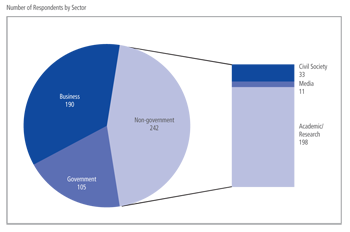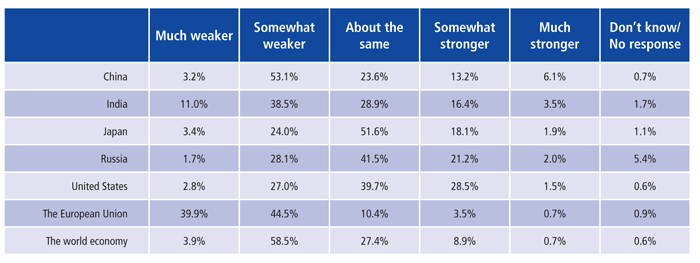ANNEX B
Note on Survey
A total of 537 opinion leaders from 26 regional economies responded to the survey. The survey was conducted from 12 June to 16 July 2012.
The survey is disseminated through PECC member committees who are asked to identify panelists based on their knowledge of the Asia-Pacific region. As this is a multi-stakeholder survey, the Council’s member committees are asked to have an equal balance between the different sets of stakeholders – business, government and non-government. Invariably, as there is some unpredictably many more panelists are invited to respond to the survey than actually do. This year the balance was 45 percent non-government, 35 percent business and 20 percent government
This is not a survey of public opinion but rather, a survey of those whose views help to influence policy-making especially at the regional level. As some of the questions tend to be technical, they require a relatively deep knowledge of developments at regional level. This is by no means a reflection of the general views of a population within any sub-region or even economy. However, we do believe that those surveyed include many of those who are responsible for influencing and sometimes making decisions on various aspects of their economy’s positions within different regional groups.
The profiles of respondents are:
Government
Panelists should be either decision-makers or senior advisors to decision-makers. As a guide, the government respondents in previous years included a number of former and current Ministers, Deputy and Vice-Ministers, Central Bank Governors and their advisors for Asia-Pacific issues, current APEC Senior Officials, and a number of former APEC Senior Officials.
Business
Panelists should be from companies who have operations in a number of Asia-Pacific economies or conduct business with a number of partners from the region. This might include each economy's current ABAC members as well as past ABAC members. In last year's survey, these included CEOs, Vice Presidents for Asia- Pacific Operations, and Directors of Chambers of Commerce.
Non-government: Research Community/Civil Society/Media
Panelists should be well-versed in Asia-Pacific affairs, being the type of people governments, businesses, and the media would tap into to provide input on issues related to Asia-Pacific cooperation. These included presidents of institutes concerned with Asia-Pacific issues, heads of departments, senior professors, and correspondents covering international affairs.
In addition to our member committees, we have also enlisted the assistance of a number of institutions who work on regional cooperation in the Asia-Pacific region to send out the survey to their members. We would like to express our appreciation to them, especially, the UN ESCAP, Asia Inc Forum, the National Business Center for APEC (Moscow), and the National Center for APEC (Seattle).
Respondent Breakdown
We do not disaggregate results for each economy but rather by sub-regions – Northeast Asia, North America, Oceania, Pacific South America, and Southeast Asia.
North America: Canada, Mexico, and the United States
Northeast Asia: China, Hong Kong (China), Japan, Korea, Mongolia, Russia and Chinese Taipei
Oceania: Australia, New Zealand, and Papua New Guinea
Pacific South America: Chile, Colombia, Ecuador, and Peru
Southeast Asia: Brunei Darussalam, Indonesia, Malaysia, Philippines, Singapore, Thailand and Vietnam

We also provide some analysis of differences in views based on whether the respondents are from government, business or the non-government (research, media, and civil society). We also provide some disaggregation of views on various forms of regional economic integration based on whether the respondents are from economies which are parties to the agreements or not.
whether the respondents are from government, business or the non-government (research, media, and civil society). We also provide some disaggregation of views on various forms of regional economic integration based on whether the respondents are from economies which are parties to the agreements or not.
The top-line results for the report are available in the annex. For a detailed breakdown of results, please visit: http://www.pecc.org/research/state-of-the-region or contact the PECC International Secretariat: This email address is being protected from spambots. You need JavaScript enabled to view it..
Economic Outlook and Risks to Growth
1 What are your expectations for economic growth over the next 12 months compared to the last year for the following economies/regions?

2 Which economies do you think present the best opportunities for growth over the next 5 years?

3 Please select the top five risks to growth for your economy over the next 2-3 years?

Eurozone Crisis
4 More specifically, on the risks from a slowdown in Europe, please give your views on the impact of the following on your economy.

5 Which of the following do you think present the most serious challenges to policy-makers in the Asia-Pacific region as a result of the Eurozone crisis?

Regional Economic Integration
6 What are the most serious challenges to doing business in the Asia-Pacific region?

7 What should be the priority issues for Asia-Pacific free trade agreements?

8 What do you think is the likelihood of success in concluding the following proposed agreements?

9 Which agreements or negotiations offer the most promising pathway(s) toward a free trade area in the Asia-Pacific region?

APEC Leaders’ Meeting
10 What do you think should be the top 5 priorities for APEC Leaders to address at their upcoming meeting in Vladivostok?

<< Previous
Next >>


 whether the respondents are from government, business or the non-government (research, media, and civil society). We also provide some disaggregation of views on various forms of regional economic integration based on whether the respondents are from economies which are parties to the agreements or not.
whether the respondents are from government, business or the non-government (research, media, and civil society). We also provide some disaggregation of views on various forms of regional economic integration based on whether the respondents are from economies which are parties to the agreements or not.








